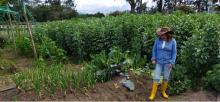Quito, Ecuador
This program is co-sponsored by the Jackson School of International Studies.
What are the strategies and practices that Indigenous farmers in Ecuador are implementing to deal with the agri-food crisis and socioeconomic and climate change challenges? In this program we will focus on understanding agroecological (or permacultural) and traditional farming systems. Traditional agri-food systems based on agroecology claim a central role for campesino agriculture in food production (campo means field, or rural area, and ino derives from Latin as ‘ownership’ or ‘relationship to’; a campesino is someone who cultivates and has a sense of belonging to the land). Agro-ecology emphasizes autonomy, the ability to decide what to produce and how to do it. The demands of rural peoples based on food sovereignty are based on agroecology, on the recovery of food as a right and the promotion of food culture and social organization. This program aims to observe, describe, and analyze agri-food systems based on ancestral knowledge, agroecology and food sovereignty, as well as the resilience that these systems provide in the face of global and local challenges. The program will be based on field visits to different Indigenous farms in Andean and Amazonian locations in Ecuador to learn from traditional Native farming practices and resilience strategies.
Note that most meals are included in the program fee.
For an in-depth look at the 2024 program, check out CHID major and program alumnus Caleb Bonilla Stevenson's video!
CHID 472 / JSIS 396: Land and Native Knowledge: Agroecology in the Andes and Amazon (5 credits SSc)
*Note that the fees stated above do not include some additional costs, including, but not limited to: airfare and personal spending money. These costs will differ by program. Be sure to read our Fees, Financing, and Withdrawal information for details about the fee structure and payment schedule.
